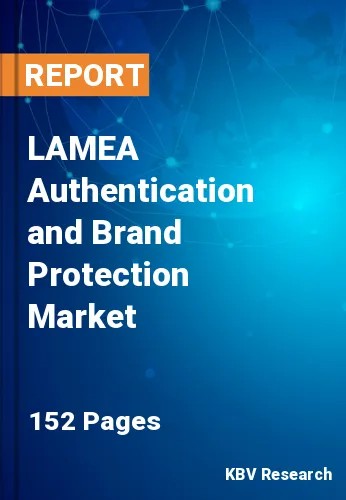The Latin America, Middle East and Africa Authentication and Brand Protection Market would witness market growth of 10.9% CAGR during the forecast period (2023-2030).
Consumer preferences for opulent lives and higher spending power are products of rapid industrialization and urbanization. Growing end-use sectors have led to an increase in theft, counterfeiting, and brand infringement. Additionally, over the past few years, the e-commerce sector has rapidly expanded. Strong and reliable internet infrastructure and consumer preferences for adopting digital media have contributed to the industry's expansion. More firms can now sell their products online to draw in a growing number of clients owing to the rapidly expanding regional e-commerce sector. The need for brand protection technologies and solutions has increased due to the additional chances this has given counterfeiters to produce goods.
As a result of the continuing increase in organized crime and counterfeiting activities in the region, the issue of Resolution 5 was brought up in June 2003. This resolution included basic requirements for reciprocal cooperation in combating piracy, a shared effort to control counterfeiting as well as illegal imports on the triple frontier, and it was brought up because it was a shared endeavor. Argentina, Brazil, Paraguay, and Uruguay undertook this important cooperative effort. Counterfeit goods often enter the region through Paraguay and seaports. Over 12 million illicit health goods have been seized due to a pan-African police operation that INTERPOL and AFRIPOL jointly organized in 2022.
The two-month operation, code-named "Flash-IPPA" (Illicit Pharmaceutical Products in Africa), finished in December, gathered law enforcement as well as drug regulatory agencies from 20 African countries to dismantle the organized crime networks responsible for the regional pharmaceutical crime. Antibiotics, anti-inflammatories, analgesics, and drugs to treat erectile dysfunction, rheumatism, and epilepsy were among the illegal drugs that were most frequently seized during the investigation. Government bodies and major market participants in the region have also made efforts to protect brands from excessive counterfeit activities. Thus, there is enormous growth potential for the market.
The Brazil market dominated the LAMEA Authentication and Brand Protection Market by Country in 2022, and would continue to be a dominant market till 2030; thereby, achieving a market value of $102.1 million by 2030. The Argentina market is showcasing a CAGR of 11.5% during (2023 - 2030). Additionally, The UAE market would register a CAGR of 10.6% during (2023 - 2030).
Based on Offering, the market is segmented into Barcodes & QR Codes, Security Labels & Inks, RFID/NFC, Holograms and Authentication Chips. Based on Application, the market is segmented into Pharmaceuticals, Food & Beverages, Electronics, Automobile, Apparel, Luxury Goods, Cosmetics and Others. Based on Technology, the market is segmented into Overt, Covert, Digital and Forensic. Based on Authentication Mode, the market is segmented into Blockchain and Smartphone. Based on countries, the market is segmented into Brazil, Argentina, UAE, Saudi Arabia, South Africa, Nigeria, and Rest of LAMEA.
Free Valuable Insights: The Worldwide Authentication and Brand Protection Market is Projected to reach USD 5.1 Billion by 2030, at a CAGR of 8.2%
The market research report covers the analysis of key stake holders of the market. Key companies profiled in the report include Authentix Inc., Avery Dennison Corporatio, Brady Corporation, De La Reu plc, WISeKey International Holding Ltd, Infineon Technologies AG, Merck KGaA, Assa Abloy AB, Centro Grafico DG and Optel Group.
By Offering
By Application
By Technology
By Authentication Mode
By Country
Our team of dedicated experts can provide you with attractive expansion opportunities for your business.

